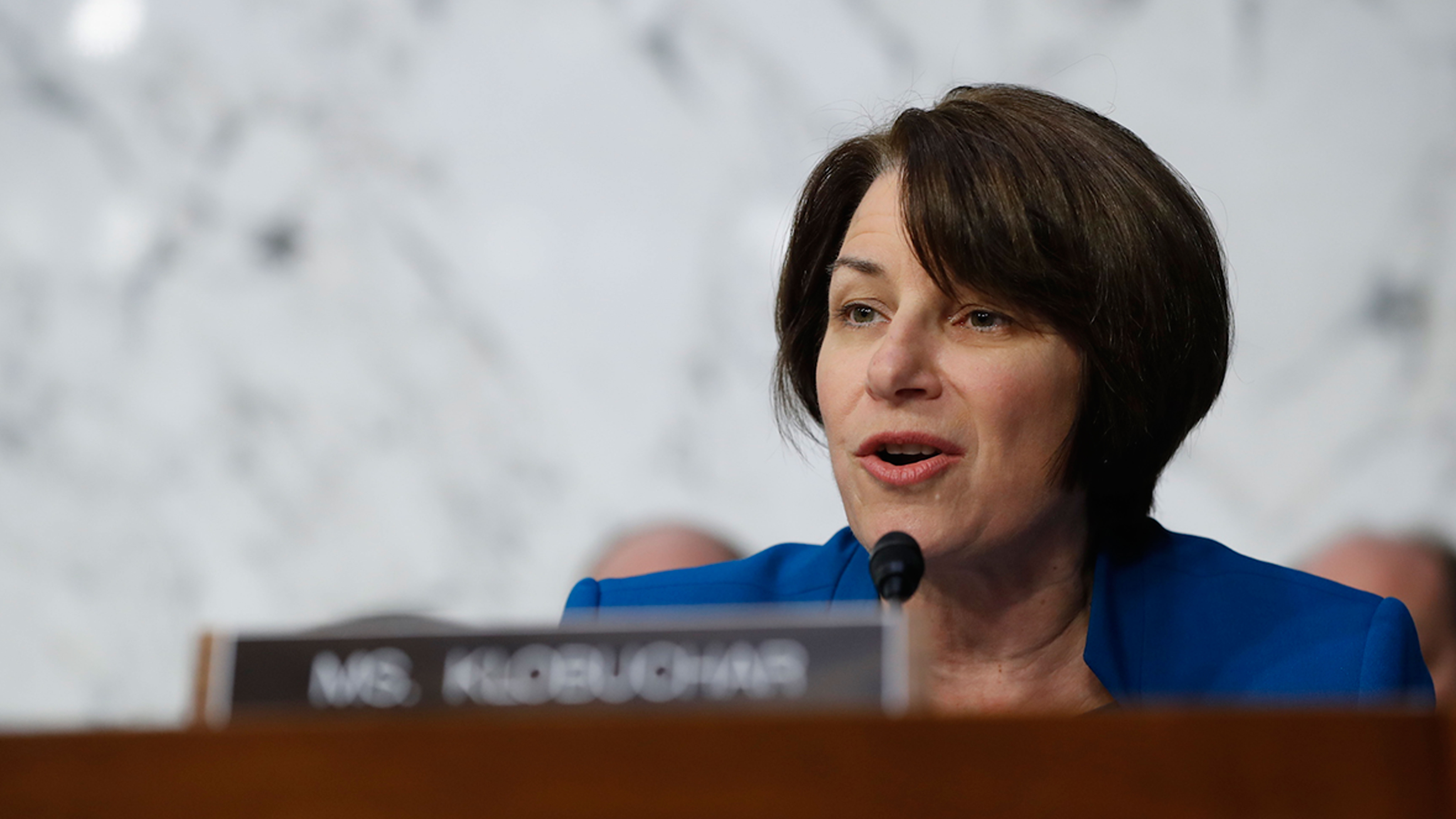Minnesota Sen. Amy Klobuchar announces 2020 presidential campaign

MINNEAPOLIS -- Minnesota Sen. Amy Klobuchar on Sunday joined the growing group of Democrats jostling to be president and positioned herself as the most prominent Midwestern candidate in the field, as her party tries to win back voters in a region that helped put Donald Trump in the White House.
"For every American, I'm running for you," she told an exuberant crowd gathered on a freezing, snowy afternoon at a park along the Mississippi River with the Minneapolis skyline in the background.
"And I promise you this: As your president, I will look you in the eye. I will tell you what I think. I will focus on getting things done. That's what I've done my whole life. And no matter what, I'll lead from the heart," the three-term senator said.
Klobuchar, who has prided herself for achieving results through bipartisan cooperation, did not utter Trump's name during her kickoff speech, though she did bemoan the conduct of "foreign policy by tweet." She instead spoke of the need to "heal the heart of our democracy and renew our commitment to the common good."
Amy Klobuchar: What to know about Minnesota senator, 2020 candidate

Asserting Midwestern values, she told a crowd warmed by hot chocolate, apple cider, heat lamps and bonfires: "I don't have a political machine. I don't come from money. But what I do have is this: I have grit."
Klobuchar, who easily won a third term last year, has pointed to her broad appeal across Minnesota as she has discussed a 2020 run. She has drawn support from voters in urban, suburban and rural areas, including in dozens of counties Trump won in 2016.
She has said that success could translate to other Midwestern states such as Michigan and Wisconsin, reliably Democratic in presidential races for decades until Trump's victory over Hillary Clinton.
She said the country's "sense of community is fracturing" today, "worn down by the petty and vicious nature of our politics. We are all tired of the shutdowns and the showdowns, the gridlock and the grandstanding."
The list of Democrats already in the race features several better-known senators with the ability to raise huge amounts of money - Elizabeth Warren of Massachusetts, Kamala Harris of California, Cory Booker of New Jersey and Kirsten Gillibrand of New York.
SEE ALSO: Who's running for president in 2020? List of Democratic candidates
The field soon could expand to include prominent Democrats such as former Vice President Joe Biden of Delaware and Vermont Sen. Bernie Sanders.
A Des Moines Register/CNN/Mediacom poll conducted by Selzer & Company in December found that Klobuchar was largely unfamiliar to likely Iowa caucus-goers, with 54 percent saying they didn't know enough about her to have an opinion, while 38 percent had a favorable opinion and 8 percent had an unfavorable opinion.
"She starts out perhaps with a better understanding of Midwestern voters, but I think she faces the same hurdles every one of them face, which is: Are Iowans going to find them either the best candidate to defeat Donald Trump or the candidate that most aligns with their ideologies and issues?" said John Norris, a longtime Iowa-based Democratic strategist. "I don't know that coming from Minnesota gives her any advantage with Iowans."
Klobuchar, 58, is known as a straight-shooting, pragmatist willing to work with Republicans, making her one of the Senate's most productive members at passing legislation.
The backdrop for her rally was the Interstate 35 bridge over the Mississippi. The span was built after the previous bridge collapsed in 2007, killing 13 people. Klobuchar had worked with then Sen. Norm Coleman, R-Minn., to help fund the new bridge and get it completed at a faster-than-usual pace.
"We worked across the aisle to get the federal funding and we rebuilt that I-35W bridge - in just over a year. That's community. That's a shared story. That's ordinary people doing extraordinary things," she said.
Klobuchar's focus in recent months has included prescription drug prices, a new farm bill and election security. She supports the "Green New Deal," a Democratic plan proposed this past week to combat climate change and create thousands of jobs in renewable energy.
But her legislative record has drawn criticism from both the GOP and some fellow Democrats. Some Republicans say Klobuchar is able to get things done because she pushes smaller issues. Some progressives say she lacks the kind of fire and bold ideas needed to bring significant change and excite voters.
Klobuchar, a lawyer and the former prosecutor in Minnesota's largest county, raised her national profile during a Senate Judiciary Committee last fall for Supreme Court nominee Brett Kavanaugh, who was accused of sexually assaulting a woman when they were both in high school.
When Klobuchar asked Kavanaugh whether he ever had had so much to drink that he didn't remember what happened, he turned the question around. He asked Klobuchar, "Have you?"
Unruffled, Klobuchar continued as Kavanaugh asked again. Kavanaugh later apologized to Klobuchar, whose father is an alcoholic.
"When you have a parent who's an alcoholic, you're pretty careful about drinking," she said. "I was truly trying to get to the bottom of the facts and the evidence."
Among the other Midwestern lawmakers who could also seek the nomination are Sen. Sherrod Brown of Ohio, who has been visiting early voting states, and Pete Buttigieg, the mayor of South Bend, Indiana, who established an exploratory committee last month.
Klobuchar campaigned with Democrats in Iowa last fall, and in December spoke to progressive farmers and activists about the importance of bridging the divide between urban and rural areas. She said the lesson learned after the 2016 election was "we are not going to leave the Midwest behind."
"This is the moment for the Midwest," she said, "and we don't want to be forgotten again in a national election."











